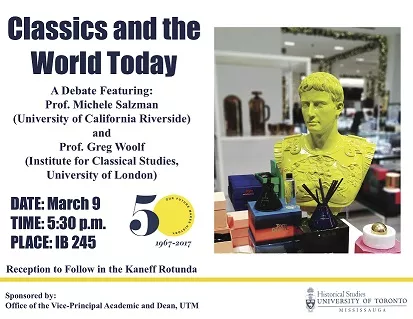Classics and the World Today 6 - March 21-22, 2024
‘Under the Empire’s Shadow: Living in Imperial States, Ancient and Modern’
A Discussion with Prof. Sue Alcock (University of Oklahoma) and Prof. Henning Börm (University of Rostock)
Even the most neutral observers of recent global events will not doubt that, as we believe in the vitality of our own democratic political systems, our everyday lives are shaped by the shadow of empire. Perhaps more than ever in our own lifetime, spheres of imperial influence are redrawn by current political and military events. The experiences of empires—those that are deemed gone and those that may appear invisible—is inscribed in the life stories of many living in the Greater Toronto Area or in other parts of the world.Classics and the World Today 5 - September 22, 2022
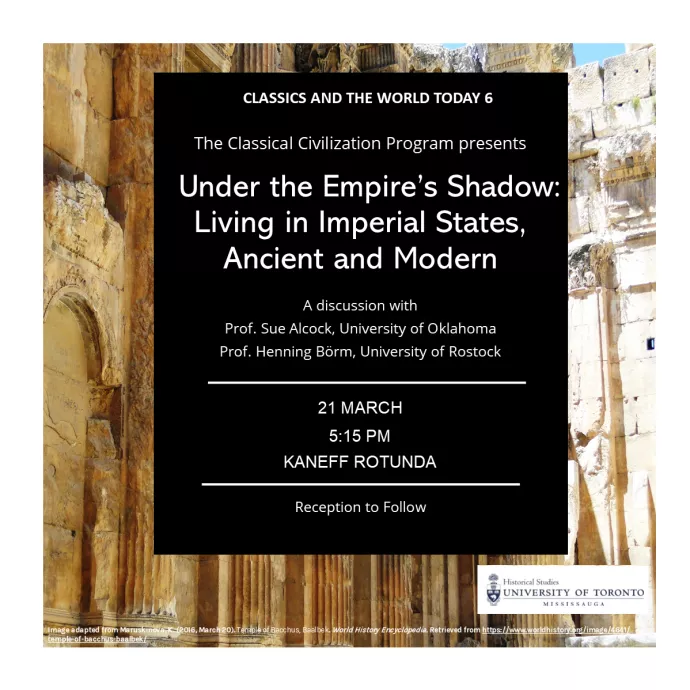
Classics and the World Today 5 - Diet, Food and Consumption in the Greek and Roman Worlds.
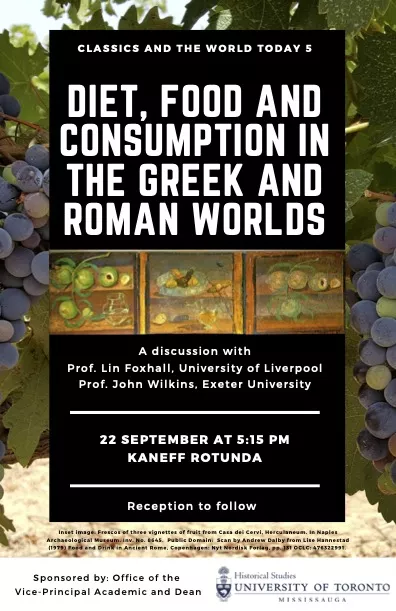
Classics and the World Today 4 - October 3, 2019
Classics and the World Today 4: Citizen Strife and Civil War in the Ancient World invoked broad questions and spurred detailed examinations about the role of historians in the study of civil wars. An outreach event on October 3, 2019 brought together about 240 undergraduate and graduate students, faculty, alumni, high school teachers and other and members of the public, to hear lectures given by speakers Ulrich Gotter (University of Konstanz) and Matt Simonton (Arizona State University).
Prof. Gotter focused on the relevance of historians in framing the category of civil war, summarizing the longue durée of the phenomenon and characterizing civil war as transgression against another part of one’s common identity, thereby emphasizing also the affective dimensions of inner-community fighting. He demonstrated the value of interdisciplinary conversations with political scientists and historians of differing historical periods. Prof. Simonton spoke to the role of non-citizens, such as refugees and foreign residents, in shaping the political events that lead to intra-state conflicts. He argued that the ancient Greek term often translated as civil war, stasis, focuses on strong partisan disagreement and tensions more than citizen bloodshed.
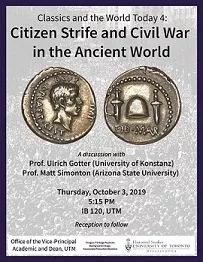
After relating this concept to the current political climate in the U.S., and using ancient Greek inscriptions documenting the aftermath of disagreement, Prof. Simonton suggested that we today can better understand the impact of political forgiveness and urged politicians to consider more closely the ancient realization that amnesty can be more important than retribution.
A question period allowed guests to engage the speakers on matters such as the role of nationalism, social media, and slaves in thinking about the ancient-modern connections. These lively discussions were continued at a public reception, where — with drinks and food — the students and other guests mingled with the speakers, introduced parents, partners and friends, and considered how these perspectives fit into their varying majors and their lives.
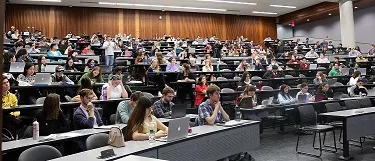
The next day, Oct. 4, professors Gotter and Simonton led a group of graduate students and faculty through a closer look at specific literary and epigraphic attestations of ancient civil wars and civil strife in the sunny collaborative research space in the newly completed Maanjiwe nendamowinan building. The focus of this second day was on modern interpretations of ancient source material, and Prof. Simonton led a seminar examining reconciliation arbitrations found in foreign judge decrees, where oaths amongst parties and a legal system of foreigners as arbitrators gives insight into the consequences of stasis. In the afternoon, Prof. Gotter focused on the transformative violence in Roman civil wars and led the group in a careful reading of key passages in Augustus’ Res Gestae and Plutarch’s Life of Sulla.
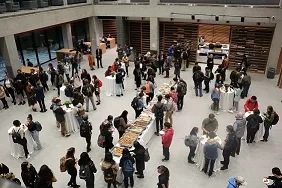
Conversations across both days stressed the importance of comparative work between the ancient and modern examples and theorizations, and the need of close reading and close analysis before generalizing. The group questioned what makes a community, a shared identity, and where might the threshold be before communities break. It further considered how communities reconciled and moved past disagreements and strife. By continuing these conversations across formal and informal events, participants were able to consider the impacts of their study in their academic work, our political environment and everyday conversations, and thus to strengthen expertise about the ancient world and to practice engaging that information in broader conversations about the world today.
The event was generously funded by the Office of the Vice-Principal Academic and Dean, UTM and the Department of Historical Studies. The 2019 event also received a ‘Classics Everywhere’ award for CaWT’s work to reach new audiences from the North American Society of Classical Studies for which the organizers are very grateful.
Text by: Alison Cleverley
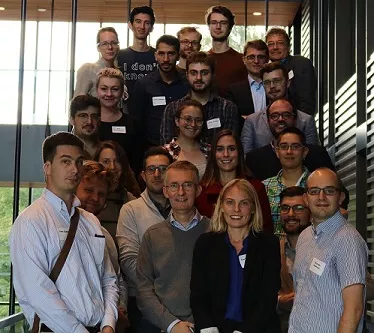
Classics and the World Today 3 - October 25, 2018
Classics and the World Today 3: Local Identities, Movement and Global Connections in Antiquity was held on Oct. 25-26, 2018 at the University of Toronto Mississauga. At the opening event, circa 250 guests from universities within the GTA, local high schools and members of the public from Peel Region joined speakers Professor Elena Isayev (University of Exeter) and Professor Miguel John Versluys (Leiden University). Prof. Isayev discussed what compels communities to extend hospitality and asylum. By interspersing ideas from modernity and antiquity, she provided insights into several examples of displaced asylum-seekers, and the respective responses by those from whom help was sought. Prof. Versluys’s talk considered how cultural connections produce new cultural forms and identities. He historicized globalization and connectivity, and emphasized that globalization does not necessarily mean standardization, nor is it an inherently value-laden concept. Rather cultures can clash or embed in either productive or problematic ways.
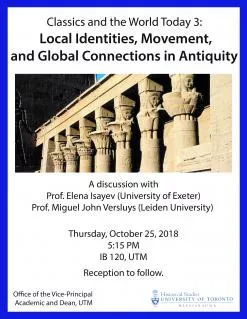
These themes were renewed the following day, when about 30 advanced undergraduate and graduate students as well as faculty from the graduate departments of Classics, Near and Middle Eastern Civilization and the Department for the Study of Religion participated in a workshop led by Professors Isayev and Versluys. This seminar debated the methodology and theorization of globalization, multiculturalism, connectivity and its relevance for the study of Ancient History. Prof. Versluys led a discussion about the possible reinventions of history, the reinterpretations of cultures and how historians interpret multiculturalism. The group studied the specific example of the building of Nemrud Dağ by the kings of Commagene and their attempts to incorporate different artistic styles and languages, thus presenting themselves as globalized. Prof. Isayev challenged the group to consider modern refuge experiences and stories alongside ancient narratives of resident aliens described by authors such as Plautus, and discussed laws from antiquity which controlled the citizens of a place, not the outsiders, in contrast with today’s laws on immigration and border control.

Both events encouraged their audiences to be aware of circumstances in which tradition is never static despite appearance, how and when refugees can be active agents, and where a multivalency of interpretations exist. The interdisciplinary nature of Prof. Isayev’s and Prof. Versluys’s work enabled a rich discussion that crossed temporal and disciplinary boundaries. As both history and the methods of studying history shed light on modern concerns, and modern concerns in turn impact the ways historians approach history and use ancient evidence, the Classics and the World Today events attempt to bring forward new ways of realizing the relevance of the past to present-day students. These events also encouraged participants to consider these themes and their impacts outside of the official settings of the seminars by incorporating spaces for informal discussion on walks and over dinner.
The organizers are grateful to the office of the Dean of UTM for continued support for these events and look forward to welcoming all those interested in the Ancient Mediterranean World at Classics and the World Today 4 in the Fall of 2019.
Text by: Alison Cleverley
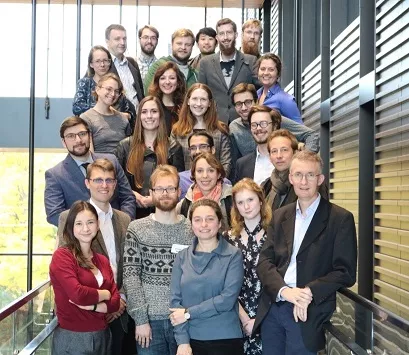
Classics and the World Today 2 - March 15, 2018
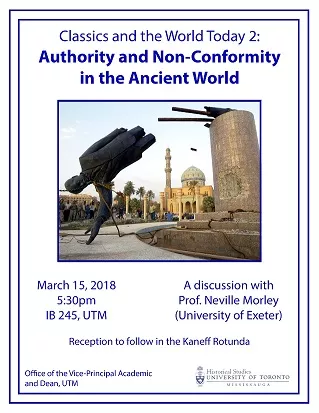
Classics and the World Today 1 - March 9, 2017
